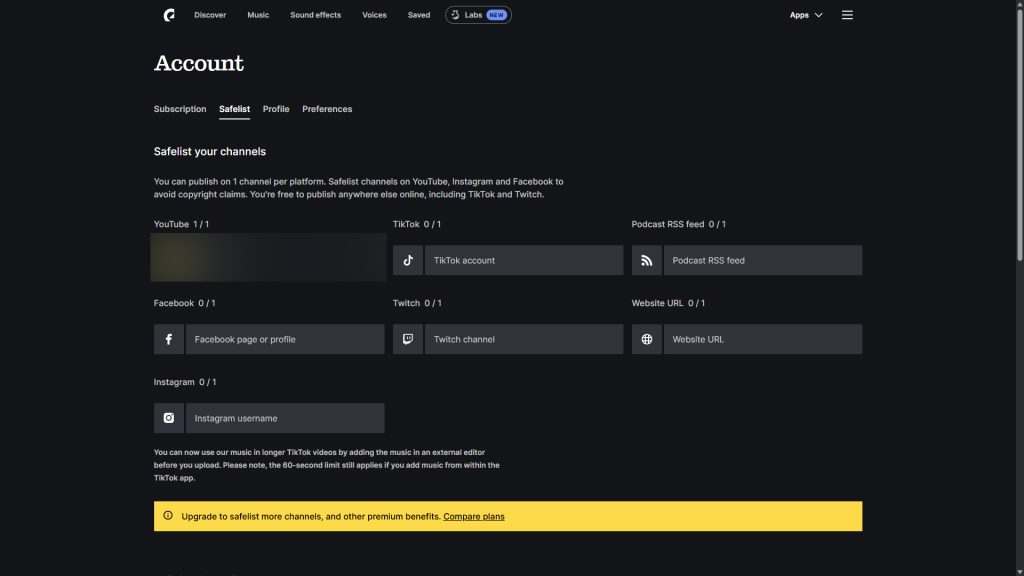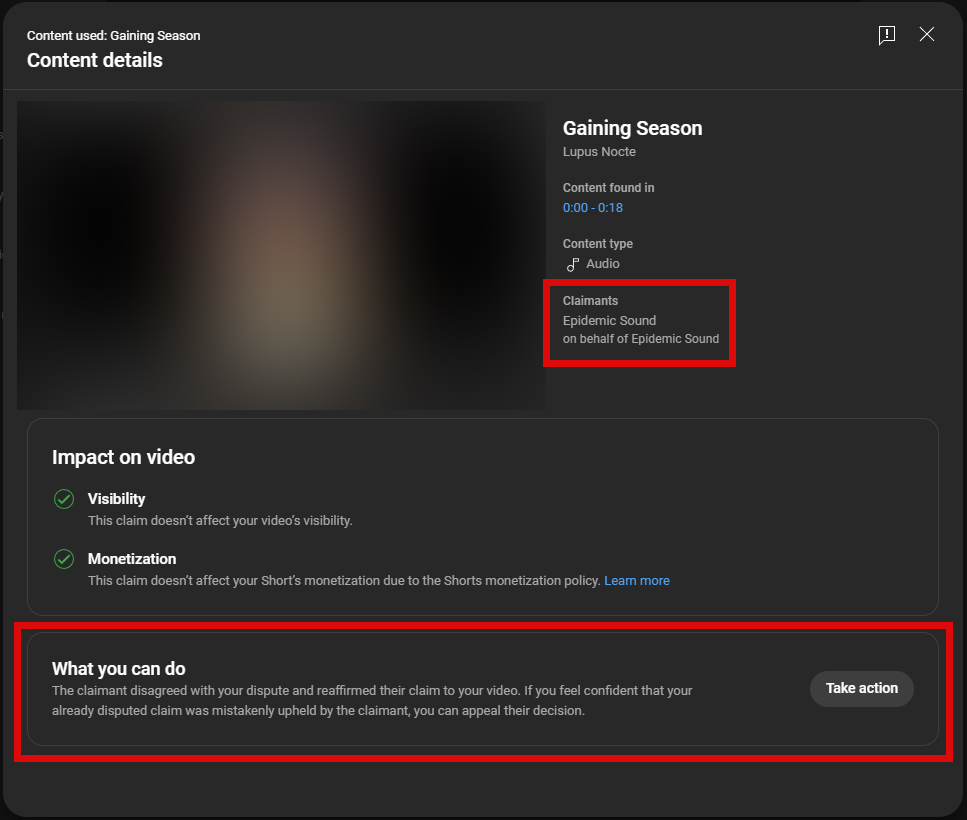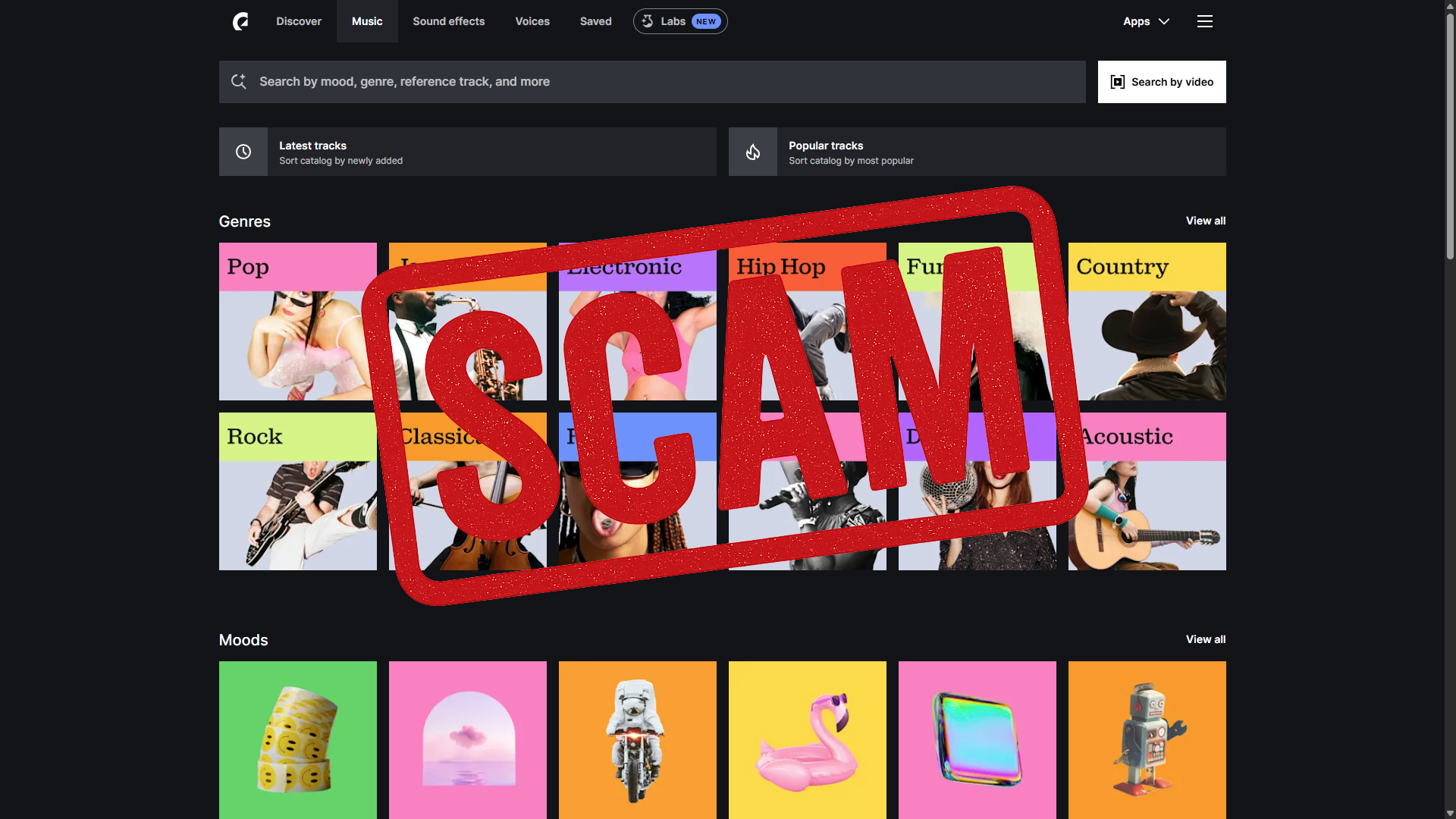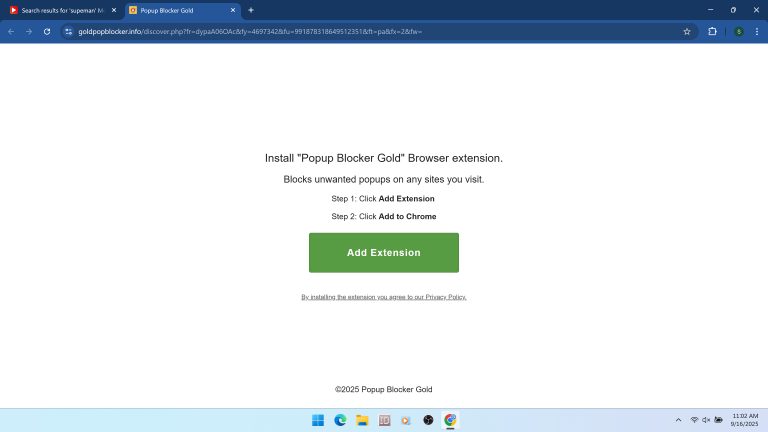Epidemic Sound scam concerns have been growing among creators, despite the platform being one of the most widely used royalty-free music providers on the internet. It markets itself as a safe, reliable solution for YouTubers, Twitch streamers, and other content creators who need licensed music and sound effects to use in their content. But in recent years, more and more complaints have surfaced about wrongful copyright claims, rejected disputes, and poor customer support. These issues have left creators asking the same questions: Is Epidemic Sound safe? Is Epidemic Sound legit? Or is Epidemic Sound a scam?
On paper, the service looks appealing. For a monthly or annual fee, subscribers gain access to a massive library of tracks and sound effects and can download and use as many audio tracks as they want, as long as they stay subscribed. Subscriptions include a process called “safelisting,” where a creator’s YouTube channel or social media account is linked to their Epidemic Sound license to prevent copyright problems. In theory, this should protect paying users from strikes and claims. But reality does not always match the promise. Reports show that even paying customers with safelisted channels still receive claims from Epidemic Sound, and in some cases, those claims are upheld even after disputes are filed.
This article explores what Epidemic Sound offers, why so many creators report serious problems, and whether the company is truly safe to use. We will also cover the steps you can take if you are wrongfully targeted, including contacting Epidemic Sound at hello@epidemicsound.com, filing complaints with consumer protection agencies like the BBB or the FTC, and keeping documentation to protect your revenue and content.
What is Epidemic Sound?
Epidemic Sound is a subscription-based platform that offers a royalty-free music library for online creators. For a monthly fee, users gain access to thousands of tracks and sound effects that can be used on YouTube, Twitch, TikTok, Instagram, and other platforms. The company promotes its music as pre-cleared, meaning you do not have to worry about copyright problems as long as you have an active subscription.

A key part of the service is its safelisting system. When you subscribe, you can register your YouTube channel or social accounts with Epidemic Sound. The idea is that Content ID, YouTube’s automated copyright detection tool, will recognize your channel as licensed and exempt you from claims. This sounds like a reliable safeguard, but many reports show that safelisting is not bulletproof. Channels with active subscriptions have still been claimed, and those claims are not always reversed quickly or fairly.
Another detail worth noting is that Epidemic Sound licenses its catalog through third-party platforms as well, such as Adobe Stock. This can cause even more confusion. A creator who obtained music through another service may still find Epidemic Sound filing claims against their videos, despite having a valid license. This raises questions about how their enforcement system is managed and whether they prioritize revenue collection over honoring licenses.
In short, while Epidemic Sound provides a large and appealing library, the way it manages copyright enforcement has caused serious frustration for creators who expect a seamless experience. The very feature that is supposed to provide peace of mind, safelisting, is often the point of failure.
Scam Reports and Problems
For many creators, the problems with Epidemic Sound go far beyond minor inconveniences. Reports describe situations where creators have lost ad revenue, had their content demonetized, or faced lengthy disputes despite paying for a subscription. In some cases, Adobe Stock customers who used audio tracks from Epidemic Sound through Adobe were spammed with copyright claims, including manual claims, showcasing Epidemic Sound’s potentially unethical and illegal pursuit of revenue from paying customers. Some go as far as calling it an Epidemic Sound scam because the company appears to profit from its own enforcement “mistakes.”

Epidemic Sound scam reports claim that even creators with active subscriptions and safelisted channels are hit with copyright claims. In some cases, disputes are rejected without explanation, leaving the creator with no choice but to email the company directly or lose revenue.
One recurring complaint involves creators who make videos with Epidemic Sound tracks played quietly in the background. Despite being safelisted, these videos have been claimed and monetization seized. In some cases, Epidemic Sound has reviewed disputes and upheld the claims anyway, even after the creator provided proof of their subscription. This is not a rare issue; it is widespread enough that many creators now consider it a risk of using the service at all.
Wrongful copyright claim on safelisted channel Hello Epidemic Sound Team, I am contacting you as a paying customer who has an active subscription with Epidemic Sound and has my YouTube channel safelisted. Despite this, Epidemic Sound issued a copyright claim against one of my videos and rejected my dispute after I provided proof of my subscription. This is unacceptable. Here are the details of the wrongful claim: Video title: EXAMPLE Video link: https://youtube.com/EXAMPLE Claimed track: Gaining Season Claimed by: Epidemic Sound Your system and your team both failed in this situation. I am licensed to use the track under my subscription, and my channel is safelisted, yet you claimed my video, interfered with my revenue, and then denied my dispute when I explained the situation.
This type of experience illustrates why so many creators feel scammed. If a company promises to protect your channel from copyright problems, then fails to do so and refuses to correct their mistake, what are customers really paying for?
Why Creators Call It an Epidemic Sound Scam
Epidemic Sound scam is a phrase used by frustrated creators not because the company is outright fraudulent, but because the way it operates feels exploitative, unethical, and damaging to the very people who pay for its service. One of the most criticized policies is that subscribers must maintain an active subscription indefinitely in order to keep their content safe. If a creator cancels, Epidemic Sound reserves the right to issue copyright claims on videos that used their audio while the subscription was active. This means that a creator could legally use music for years while paying, but the moment they stop, old videos can suddenly receive copyright strikes or claims. Many view this as a hostage model that pressures creators into lifelong payments. It is not just inconvenient, it is immoral and manipulative.
When a copyright claim is placed, monetization for that video is often diverted away from the creator and sent directly to Epidemic Sound. This creates a double-dip scenario where the company profits from both subscription fees and ad revenue generated from claimed videos. Instead of protecting subscribers, the system penalizes them. This is why creators often say the service feels like a scam: they are paying for peace of mind, yet the very system that should safeguard their work is turned against them.
Another issue is the dispute process. When creators provide proof that their channel is safelisted and that they have an active subscription, Epidemic Sound often upholds its own claims anyway. The only next step is to contact them directly by emailing hello@epidemicsound.com or submitting a message through their contact form. During this time, monetization remains frozen, leaving creators without income from their own videos. In many cases, support never responds at all, or responses come after long delays with no resolution.
Because of this, some creators have been forced to escalate further by filing complaints with outside organizations such as the Better Business Bureau (BBB) and the Federal Trade Commission (FTC). Others have turned to social media or legal counsel for help. These are extreme steps that should never be necessary for a legitimate licensing service, yet they have become common for those who feel trapped by Epidemic Sound’s aggressive copyright enforcement and unfair subscription model.
Pros and Cons of Epidemic Sound
It is important to recognize that Epidemic Sound is not entirely negative. The service has clear strengths, which is why so many creators continue to use it. However, the weaknesses are severe and often overshadow the benefits. Many creators ultimately conclude that the disadvantages outweigh the positives.
Pros
The strongest advantage of Epidemic Sound is its massive music library. With tens of thousands of tracks and sound effects covering nearly every genre, it gives creators immediate access to professional-grade audio that would normally cost a fortune to license individually. For content creators who need background music for YouTube, Twitch, TikTok, or podcasts, this convenience is hard to ignore. The library is high quality, varied, and constantly updated, making it appealing to both small and large channels.
Another advantage is accessibility. Instead of dealing with individual contracts or licensing agreements, creators can pay a flat monthly or annual subscription and gain instant access. This levels the playing field for independent creators who cannot afford custom scores or complicated licensing. In theory, the safelisting system is also a positive. Linking your YouTube or Twitch channel directly to your subscription should prevent copyright issues automatically, giving subscribers peace of mind. For new creators who are just learning about copyright law, this feels like an easy solution.
- Massive, professional-quality music and sound effects library.
- Affordable subscription compared to individual track licensing.
- Wide variety of genres to match almost any type of content.
- Safelisting promises automated protection against copyright claims.
Cons
The disadvantages, however, are what turn many people against the service. The most damaging issue is that safelisting does not always work. Countless reports describe channels with active subscriptions and safelisted accounts still receiving copyright claims. These claims redirect ad revenue from creators back to Epidemic Sound until disputes are resolved. That means paying customers lose income while the company profits from the very videos they licensed music for. This feels predatory and is the main reason so many call it a scam.
Another serious problem is the subscription model itself. Once you stop paying, you lose the right to use any music from the library. Worse, this applies to past videos as well. That means old content uploaded while you were a paying customer can suddenly become vulnerable to copyright claims once your subscription ends. For creators with hundreds of videos, this creates an indefinite financial trap that feels less like a subscription and more like extortion.
Customer service is another weak point. Disputes are often rejected even when proof of safelisting is provided. After that, the only option is to email hello@epidemicsound.com or use the contact form. Many creators report slow responses, unhelpful replies, or no response at all. In the meantime, monetization remains frozen and creators lose valuable revenue. A company that handles copyright enforcement should respond quickly and fairly, but Epidemic Sound fails to do so.
Transparency is also lacking. The company advertises peace of mind, but in practice many creators discover that their system is unreliable and their policies exploitative. The fear of old videos being claimed forces creators into perpetual payments. Instead of offering long-term protection, Epidemic Sound uses copyright as a tool to keep people subscribed indefinitely. This business model is widely viewed as unethical.
- Safelisting failures that result in revenue loss for paying customers.
- Old videos become vulnerable to copyright claims if you cancel your subscription.
- Poor customer service with slow or absent responses.
- Exploitative business model that pressures creators into indefinite subscriptions.
- Lack of transparency between marketing promises and real-world performance.
Is Epidemic Sound Safe or a Scam?
So, is Epidemic Sound safe? Is it legit, or is it a scam? The answer is complicated. Epidemic Sound is a legitimate company with real offices, a functioning product, and an enormous music library. It is not an outright scam in the sense of a fake company. However, the way it handles copyright enforcement and customer service makes it unsafe in practice.
As long as you pay every month and keep your channels safelisted, Epidemic Sound generally works. But when things go wrong, they often go very wrong. Claims are filed even on licensed content, disputes are rejected, and customer support is unreliable. For a creator, this is a nightmare scenario. Your revenue is disrupted, your time is wasted, and your trust in the system is destroyed.
The reality is that Epidemic Sound is both legitimate and problematic. It is not a scam in the strictest sense, but the way it operates makes many customers feel scammed. Safe is not the right word; cautious is better. If you use Epidemic Sound, do so with the knowledge that problems may occur, and prepare yourself to fight for your rights when they do.
What to Do if You’re Targeted
If you are hit with a wrongful claim from Epidemic Sound, there are several steps you can take. First, always dispute the claim through YouTube’s built-in system. Provide proof of your subscription and safelisting. If the dispute is rejected, email them directly at hello@epidemicsound.com. Keep copies of all communication for your records.
If they still do not respond, escalate. File a complaint with the Better Business Bureau (BBB) and the Federal Trade Commission (FTC). These organizations exist to hold companies accountable and to track patterns of abuse. The more creators report, the harder it becomes for Epidemic Sound to ignore.
Here is an example of an email a creator sent to Epidemic Sound after a wrongful claim: Hello Epidemic Sound Team, I am contacting you as a paying customer who has an active subscription with Epidemic Sound and has my YouTube channel safelisted. Despite this, Epidemic Sound issued a copyright claim against one of my videos and rejected my dispute after I provided proof of my subscription. This is unacceptable. Your system and your team both failed in this situation. I am licensed to use the track under my subscription, and my channel is safelisted, yet you claimed my video, interfered with my revenue, and then denied my dispute when I explained the situation. I am demanding that you immediately reverse this claim and confirm the reversal in writing. If this is not resolved, I will dispute every charge with my payment provider to recover the full amount I have paid to Epidemic Sound. At that point, it will be clear that Epidemic Sound does not deliver the service it advertises and charges for.
In addition to these steps, always document your subscription details, payment history, and proof of safelisting. This evidence strengthens your position in disputes. You may also want to seek advice from creator communities online, where others share their experiences and tips for dealing with Epidemic Sound claims. While this does not guarantee success, it provides valuable support when dealing with a system that feels stacked against you.
Verdict
Epidemic Sound is not an outright scam, but calling it completely safe would also be misleading. On the surface, it is a legitimate royalty-free music provider with one of the largest and most appealing libraries available to creators. Thousands of YouTubers, streamers, and businesses rely on it every day. However, the real problem lies in how the company manages copyright enforcement, customer support, and subscription policies.
Paying customers with safelisted channels continue to report wrongful copyright claims, frozen monetization, and disputes that are unfairly rejected. Once your subscription ends, even videos uploaded during your paid period remain vulnerable to copyright strikes, which forces many creators into indefinite payments. This practice may be legal under their terms of service, but it feels predatory, exploitative, and unethical.
The verdict is that Epidemic Sound can be used successfully if you understand the risks and prepare for problems. Always keep proof of your subscription, document your safelisting, and be ready to escalate complaints to consumer protection agencies if necessary. If you only need occasional music or if you expect flawless protection, Epidemic Sound is likely to disappoint you.
Epidemic Sound is legitimate, but its practices leave many creators feeling scammed. Treat it as a tool with major caveats: valuable for its music, dangerous for its policies. Use it cautiously, never assume you are fully protected, and always have a backup plan.



Leave a Comment